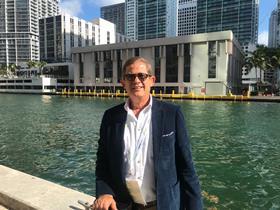
How’s the congress been this year?
Jorge Sauma: It’s the eighth congress in total, and the fourth in Miami. We are very satisfied to have got over 600 attendees, coming from 42 countries, and all the talks have been very well received.
What have been the key themes up for discussion?
JS: In all of our recent congresses a key theme has been TR4. We are understanding it better, and we know it can be a very big problem but we are taking all possible measures to exclude it from Latin America. We’ve heard there are also some alternatives in genetic improvement in terms of other varieties with more resistance. There are a lot of brains here from all over the world looking for a solution, so I feel that maybe they will succeed.
The other key point is logistics. We know there’s a problem coming [in terms of the impact of the reduction of sulphur in fuel] and it’s important to look at what can be done. And the other really interesting aspect is the market and how it’s evolving for bananas.
Will prices have to rise in view of the transport situation?
JS: I consider that instead of talking about ‘how much lower’ prices will go [at retail], it should be a question of ‘how much higher?’ You cannot always put all the cost of banana supply onto the grower. I hope we can see an end to this competition and fight for lower prices. Nothing good is coming out of that. It’s not sustainable.
In spite of worries about pricing, the market is doing well. Do you feel there’s potential to increase consumption further?
JS: I consider that we haven’t fully done the job in that particular area. Many years ago there was a group of trade companies trying to increase the consumption of bananas in the US, but later on it stopped because the trust laws meant they couldn’t work together, and that was a pity. I think there’s room to increase [consumption], and we may look at promoting it more across the whole market. In our country we are more focused on the European and US markets, but there is room to try to produce not only the same bananas but we can also try to market the Red Macabu or other varieties to give another alternative to consumers. We will try to coordinate efforts in that area.
What’s the latest on the meetings with the EU about MRLs and chemical usage?
JS: I think it’s very important that we’ve had some discussions, and also what’s important is that they take decisions scientifically, not because of ideological reasons or as a kind of phytosanitary barrier to avoid more entrants. In our country we are trying to reduce usage – we have a biological control lab and molecular biology, and more than 75-80 per cent of our research goes on trying to reduce chemicals.
How’s this season looking from a production perspective?
JS: We are not having a good year as production is a little bit down because of the weather. Two years ago we reached more than 127 million boxes, which is the highest in our history, but last year was a four per cent decrease and it’s four per cent down again this year. The climate has been very unpredictable, and we will maybe reach 119m boxes this year..
How do you see the Brexit situation?
JS: We did a seminar on it at Corbana and I’m now a member of the British Chamber of Commerce. For us, the British market is very important and we send a lot of fruit there. We will try absolutely to maintain our supply to Britain.



